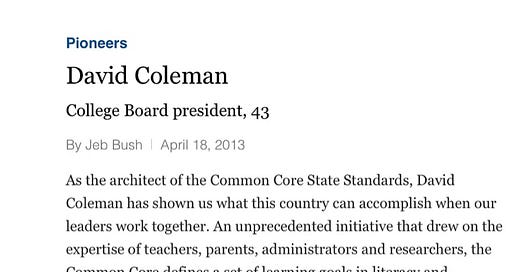If you’ve not had the chance to watch David Coleman’s teacher professional development video from 2010ish modeling for teachers how to teach close reading using Martin Luther Kings “Letter from Birmingham Jail” as a text, you can get a good feel for it from Jayne Marlink.
In this podcast Jayne, director of the California Writing Project when the Common Core State Standards were implemented, remembers her experiences in teacher professional development around reading instruction. Coleman’s fetish for the objective correlative influenced school teachers and administrators, who may not have prior knowledge of T.S. Eliot, to approach the reading of texts and then writing analytically about them in harmony with two principles.
First, readers must stay within the four corners of the text in search of evidence for claims. Questions that arise should be text-dependent. Second, because the focus should remain squarely on textual signifiers, the role of prior knowledge should be minimized. Pygmalion, the sculptor, fell in love with his marble statue and forgot about human flesh.
Coleman’s choice of the Letter as a core piece of his lesson modeling the proper way to instruct students to practice close reading was, for Jayne and many others, including me, a problem. Listen to Jayne’s story to find out why the video taught her the one thing Coleman wanted to silence: It is impossible for her to read this Letter without prior knowledge on full throttle and the freedom to fly as close to the text or as far away as her thinking takes her. Her wings are not made of wax.
Few scholars of schools, including Jayne, including me, are against using specific evidence from a text to build an interpretive argument. Yes, learners need instruction in finding and using textual evidence. Yes, there are times when every reader must set aside what they know or think they know in order to focus on the meaning conveyed by the language of the text. Yes, assigning written essays that develop an argument with claims, evidence, and analysis derived from a text is worthwhile academic work.
But is that all there is? What happens when the statue comes to life, when the wax melts?






Share this post